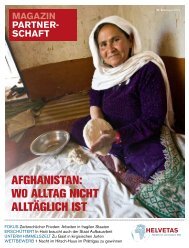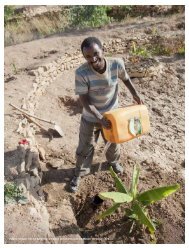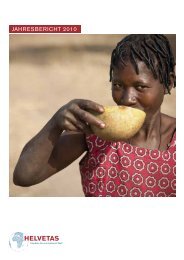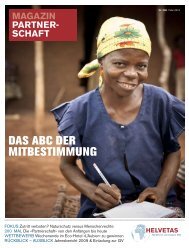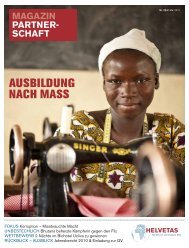Report Feasibility study organic bitter tea Cao Bang - Helvetas
Report Feasibility study organic bitter tea Cao Bang - Helvetas
Report Feasibility study organic bitter tea Cao Bang - Helvetas
You also want an ePaper? Increase the reach of your titles
YUMPU automatically turns print PDFs into web optimized ePapers that Google loves.
<strong>Feasibility</strong> Study Organic Bitter Tea in <strong>Cao</strong> <strong>Bang</strong>: 2007<br />
visit. Furthermore, the flow of produce from individual producers is under greater control<br />
with centralised marketing as a group (IFOAM, 2004).<br />
Several ICS have been set up in Vietnam already, for example by the <strong>tea</strong> company Ecolink.<br />
This ICS includes over 200 farmers as well as a processing unit and several warehouses for<br />
<strong>tea</strong> storage. One staff of Ecolink is assigned to manage the ICS, while the ICS inspectors<br />
are government staff (from PPSD or extension service) that do the ICS inspections on a<br />
part-time basis. However, Ecolink is responsible for arranging training for these ICS<br />
inspectors. Some NGOs in Vietnam, such as ADDA, can provide training and assistance in<br />
setting up an ICS.<br />
6. COST BENEFIT ANALYSIS<br />
6.1. Costs of external certification<br />
The cost of certification generally consist of two parts, the first is the certification fee<br />
(based on the kind of certificate needed) and the second the actual cost for the inspection. If<br />
several certificates are required (for example, both EU and JAS) it is most economic to<br />
select one certification body that can issue both certificates through one inspection visit.<br />
Recently, a regional CB (ACT Thailand) set up collaboration with a well-established<br />
European CB (ICEA Italy), which offers a very interesting menu of certification options to<br />
operators in South East Asia, i.e. IFOAM Accredited and BioSuisse certification through<br />
ACT as well as EU, NOP and JAS certification through ICEA.<br />
The cost for certification though this arrangement ranges between 350 and 450 Euro,<br />
depending on the certificate required. The two partners also give a discount if more than<br />
one certificate is requested. Based on the certificate needed there could be some additional<br />
costs, for example for samples to be analysed for chemicals (300 Euro per sample). Total<br />
cost for three certificates: EU (direct) 400 Euro, JAS 440 Euro, Korea (through ACT<br />
private standards) 350 Euro. Total: 1190 Euro - 20% = 950 Euro, plus 300 Euro for the<br />
sample. Total costs 1250 Euro.<br />
Inspection fees are 150 Euro per day per inspector, plus all local and international travel<br />
and food and lodging. With 100 producers there are 10 producers to be inspected plus the<br />
processing unit (3 days), plus 1 day for ICS check. Adding 2 days for travelling to <strong>Cao</strong><br />
<strong>Bang</strong> makes a total of 6 days or 900 Euro (6 x 150 Euro). Finally, we need to add the travel<br />
from <strong>Bang</strong>kok (300 USD) as well as food and lodging for 6 days (240 USD, 6 days @ 40<br />
USD/day).<br />
Adding the costs for certification (1250 Euro or 1750 USD) and the inspection (900 Euro<br />
or 1260 USD) and the travel, food and lodging (540 USD) gives a total of 3,550 USD.<br />
(Please note that the current exchange rate of Euro to US dollar is quite unfavourable.)<br />
6.2. Costs of operating the ICS<br />
There are initial funds required for setting up the ICS and training producers, ICS<br />
personnel and inspectors. However, since most of the costs, including for trainers, are local,<br />
total funding needs are not high. An estimated initial expenditure of 500 - 1000 US dollar<br />
may be needed, which could maybe be requested from <strong>Helvetas</strong> or provincial funding.<br />
- 20 -




